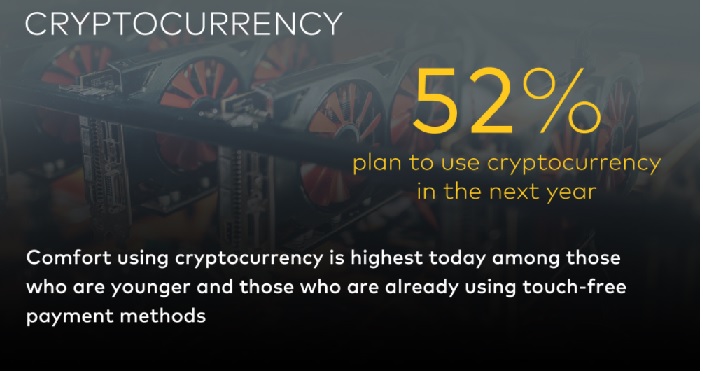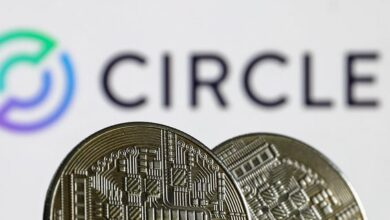
The report also found that 52 percent of consumers surveyed across MENA said they will use cryptocurrencies in the upcoming year.
The recently released Mastercard New Payments Index has revealed that 94% of consumers in Saudi Arabia will consider using at least one emerging payment method, such as cryptocurrency, biometrics, contactless, or QR code, in the next year. The report also found that 52 percent of MENA consumers surveyed said they will use cryptocurrencies in the upcoming year compared to 56 percent of those surveyed in KSA ( Kingdom of Saudi Arabia).
Over two-thirds of respondents (68%) agree they have tried a new payment method they would not have tried under normal circumstances, but the pandemic has galvanized people to try flexible new payment options to get what they want, when they want it. With this interest and consumer demand also comes a greater expectation for businesses to provide multiple ways to shop and pay. In fact, 70% of consumers in Saudi Arabia say they would avoid businesses that do not accept electronic payments of any kind. Additionally, nearly 3 out of 4 (73%) Saudi shoppers say that digital payment methods help them save money.
“The pandemic made us think differently, partly out of necessity,” said Craig Vosburg, Chief Product Officer at Mastercard. “To deliver the choice and flexibility that consumers need – and increasingly expect –retailers worldwide need to offer a range of payment solutions that are easy to access and always on. As we look ahead, we need to continue to enable all choices, both in-store and online, to shape the fabric of commerce and make the digital economy work for everyone.”
In the first quarter of 2021 alone, Mastercard saw 1 billion more contactless transactions worldwide as compared to the same period of 2020. All signs point to a continued growth path for contactless, with nearly 7 in 10 consumers globally anticipating using a contactless card this year. “More than ever, consumers in Saudi Arabia are adapting and embracing payment innovations. Businesses, both big and small, must respond to this evolving trend and deliver on an enhanced omnichannel consumer experience for the new-age shopper. We are closely working with our partners and retailers to deliver secure and diverse payment technologies for the omnichannel generation,” said J.K. Khalil, Country Manager – Saudi Arabia, Bahrain and the Levant, Mastercard.
Looking to the future, digital currencies wallets and money transfers, biometrics, contactless and QR codes are trending as emerging payments technologies as people’s comfort with them and understanding of them increases and the use of cash decreases. In fact, 92% of consumers in the region have more ways to pay compared to this time last year. The exploding interest in new payment technologies may encourage businesses to expand their options at checkout.
The Mastercard New Payment Index found:
Cryptocurrency1 Gains Ground – Today consumers can buy, sell, and trade cryptocurrency as a commodity or investment. Consumers are also increasingly showing interest in being able to spend crypto assets for everyday purchases. As global interest in digital currencies continues to accelerate, 56% of consumers in Saudi Arabia say they plan to use cryptocurrency in the next year, with more than half (69%) noting they are more open to using it than they were a year ago. While consumer interest in cryptocurrency – especially floating digital currencies such as Bitcoin – is high, work is still required to ensure consumer choice, protection, and their regulatory compliance.
Mastercard recently announced that it will start supporting select cryptocurrencies directly on its network.
QR Codes are Cleaner and More Convenient – Growing markets are leveraging QR-based options as a clean and convenient way to interact with merchants. 59% of people in Saudi Arabia expect to use more payment technologies like QR codes in the next year. Consumers also find that that QR codes are cleaner (73%) and more convenient (71%) for in-person payments and have a significant potential to reduce cost of payment acceptance and increase financial inclusion.
Biometric Payments are More Trustworthy – Perceptions of safety and convenience have been front and center for people over the past year. 5 in 10 (50%) consumers in Saudi Arabia say they plan to use biometric verification methods like gait or walk assessments and fingerprint authorization. In fact, nearly 7 in 10 people (69%) feel safer using biometrics to verify a purchase than entering a pin.
Digital Wallets and Money Transfers Surge in Popularity – As digital wallet services continue to proliferate in the Kingdom, the technology has seen a surge in popularity. 66% of Saudi consumers say that they would use digital wallets next year while 68% say they plan to use digital money transfer services.
With consumer interest around new payment technologies, the expectation for businesses to adapt for the long-term is here to stay. Over three in four consumers in Saudi Arabia (77%) say that they prefer to shop at businesses that have both an in-person and online presence, and 76% noted being more excited to shop at retailers that can offer the latest payment methods, and 75% said they would be more loyal to retailers who offered multiple payment options.
As one way to address this consumer preference for fast, touch-free payment experiences, many merchants are turning to contactless payments. Nearly 89% of in-person transactions are now contactless in Saudi Arabia as most merchant categories are seeing an increase as a share of total in-person transactions year-over-year in the first quarter of 2021.





